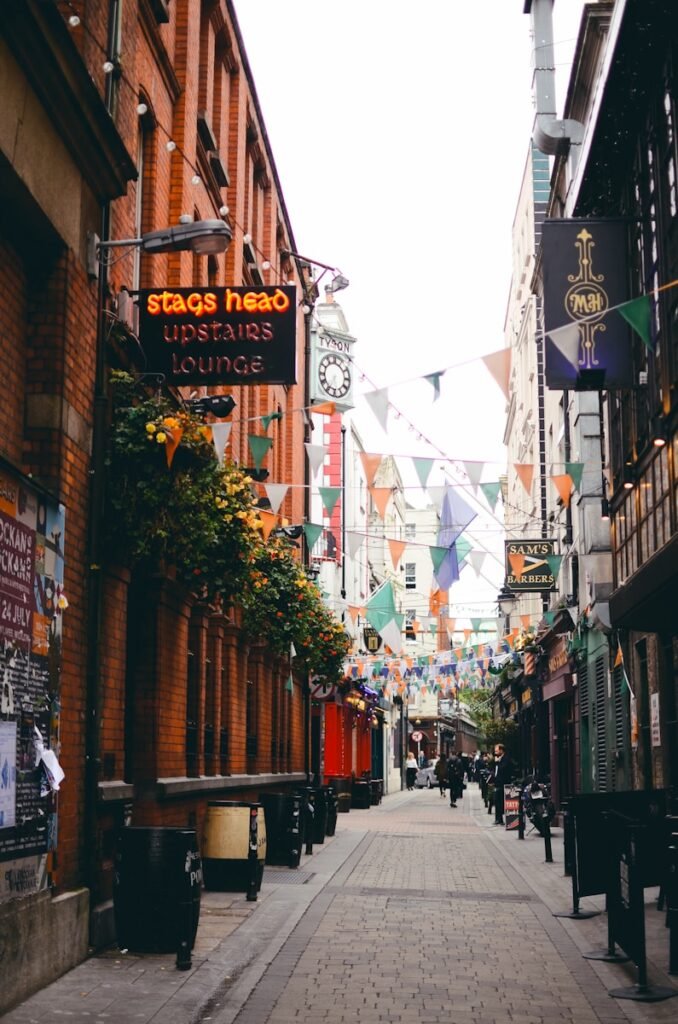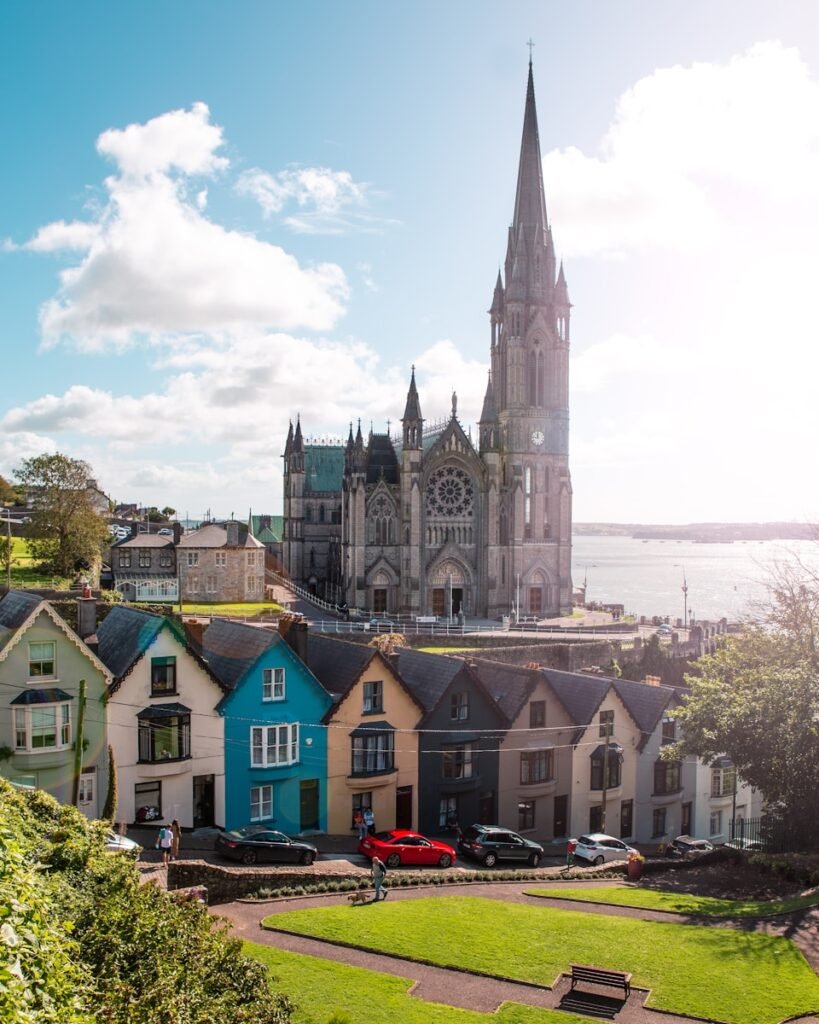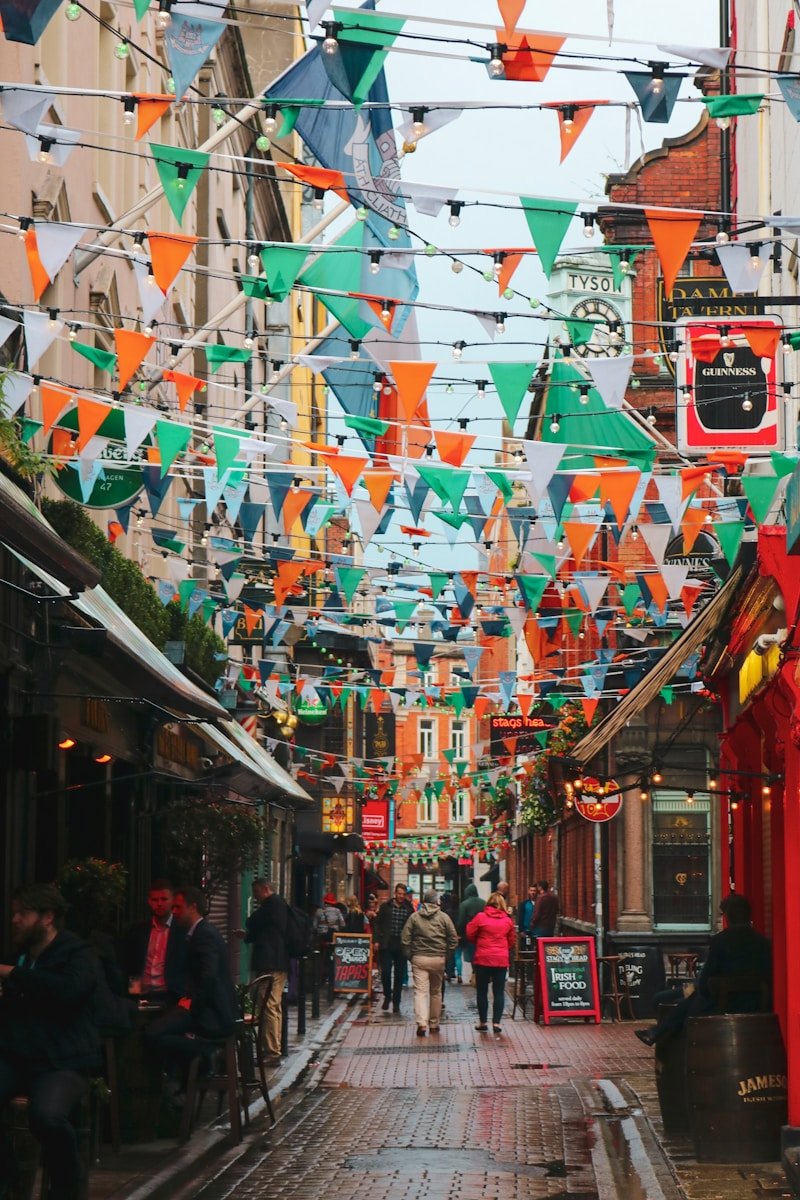Everything You Need to Know About the Digital Nomad Visa for Ireland in 2025
If you’re a digital nomad—or even just a remote worker looking for a change of scenery—Ireland has something pretty cool for you! The Ireland Digital Nomad Visa, introduced in 2025, allows remote workers to live and work from this stunning country for up to 2 years. But before you start packing your bags for the rolling green hills or bustling streets of Dublin, you’ll want to know all the details. From eligibility to the application process, I’ve got the lowdown. In this article, I’ll walk you through everything I learned (and a few mistakes I made) so you can make the best decisions when it comes to calling Ireland your home for a while.
What is the Ireland Digital Nomad Visa?
If you’re someone who’s been dreaming of combining work with travel, or simply looking for a way to live and work in Europe while enjoying a new lifestyle, the Ireland Digital Nomad Visa might just be the perfect option for you. This visa was introduced to cater to remote workers, freelancers, and digital nomads who want to call Ireland home for a period of time while continuing to work for their overseas employers or clients. It’s an exciting opportunity, especially for those who’ve always wanted to experience living in one of Europe’s most dynamic and picturesque countries.
How It Benefits Remote Workers
The Ireland Digital Nomad Visa is designed to make it easier for remote workers to live in Ireland while maintaining their job or freelance work with clients located outside of Ireland. It opens up a world of possibilities for digital nomads who want to enjoy the charm of Irish culture, stunning landscapes, and the convenience of working remotely. Ireland is a hub for tech professionals, with a strong digital infrastructure, making it a natural fit for those in remote work.
One of the key benefits is the opportunity to live and work legally in Ireland without having to leave the country every few months. The visa ensures that you can remain in the country as a legal resident while continuing to perform your remote work without any concerns about your status or the need for constant renewals. It also allows you to immerse yourself in Ireland’s unique culture, historical landmarks, and thriving digital community, all while maintaining your income from abroad.
This visa also helps foster a sense of freedom, allowing you to explore Europe’s diverse offerings during weekends or holidays. Whether it’s hiking through the Irish countryside, visiting coastal towns, or simply enjoying the lively atmosphere in Dublin, this visa makes it possible to truly experience what Ireland has to offer while pursuing your career remotely.
Why It’s an Attractive Option for Digital Nomads Looking to Live in Europe
When it comes to choosing the right country for a digital nomad lifestyle in Europe, Ireland offers several advantages. First off, Ireland is an English-speaking country, which is a huge plus for many remote workers who prefer to work in a language they’re fluent in. The country is also known for its strong tech industry and vibrant startup scene, making it a great place to network, collaborate, and even explore new job opportunities.
The country is also a convenient gateway to the rest of Europe. Whether you’re interested in exploring nearby European cities or taking quick weekend getaways, Ireland’s location makes it easy to travel. Add to that the welcoming attitude towards remote workers, and you’ll find that Ireland has become a hot spot for digital nomads who want to balance their professional goals with a rich, cultural experience.
Moreover, Ireland offers a relatively straightforward visa process compared to some other European countries. The Digital Nomad Visa is not overly complicated, and it comes with reasonable requirements that make it a more accessible option for remote workers compared to other destinations in Europe.
Who Is Eligible for the Ireland Digital Nomad Visa?
This visa is open to remote workers who are employed by companies outside of Ireland or are self-employed with clients located abroad. Here are the main eligibility requirements:
- Employment Status: You must work for a company that is based outside of Ireland, or you need to be a freelancer with international clients. If you are self-employed, you should demonstrate that you have regular contracts with clients that are based outside of Ireland.
- Income Requirement: There is an income threshold you must meet to qualify for the Ireland Digital Nomad Visa. Typically, applicants need to show they earn a minimum of €30,000 per year. This income must be generated from your remote work, not from within Ireland.
- Valid Passport: Like any visa process, you must have a valid passport and prove your identity to meet the immigration requirements.
- Remote Work Role: Your work must be fully remote, meaning it doesn’t require your physical presence in the country or require you to work for an Irish company.
- Health Insurance: Applicants must provide proof of valid health insurance that covers their stay in Ireland. This ensures that you are covered for any medical needs during your time in the country.
In essence, if you’re a digital nomad with steady work and meet the income requirements, this visa offers you the chance to live in Ireland while working remotely.
Length of Stay and Possible Extensions
The Ireland Digital Nomad Visa typically grants a stay of up to 12 months. This is a fantastic option if you’re planning on spending a year working in a new country. During that time, you’ll be free to travel within Ireland and enjoy the lifestyle it offers.
After your initial stay, you can apply for an extension. Extensions are usually granted if you can continue to meet the eligibility requirements, especially the income threshold and the nature of your work. This is a great option for those who want to extend their stay and continue exploring Ireland or perhaps delve deeper into the local community.
It’s also worth noting that your visa doesn’t necessarily restrict you to only working from Ireland. You can take your remote work with you as you explore the country, with opportunities to travel while keeping your job or freelance contracts intact.
This flexibility makes the Ireland Digital Nomad Visa one of the best options in Europe, allowing you to enjoy everything Ireland has to offer while continuing to build your career remotely.

How to Apply for the Ireland Digital Nomad Visa
Applying for the Ireland Digital Nomad Visa is a straightforward process, but it requires attention to detail. If you’re planning on calling Ireland your home while you continue to work remotely, it’s essential to follow each step carefully. Here’s a step-by-step guide to help you navigate the application process.
Step-by-Step Guide to the Application Process
- Check Eligibility Requirements
Before starting your application, make sure you meet the eligibility criteria. Ensure that you are employed by a company outside of Ireland or are self-employed with international clients. You must also meet the income threshold, which typically starts at €30,000 per year. This will ensure that you’re financially stable while living and working in Ireland. - Gather Necessary Documents
The next step is to gather all the required documents. These will help prove your eligibility, income, and remote work status. We’ll dive deeper into the specific documents you need later, but it’s crucial to get everything in order before submitting your application. It’s better to have everything prepared than to face delays later on. - Complete the Application Form
You can find the application form for the Ireland Digital Nomad Visa on the Irish government’s immigration website. The form will ask for basic information such as your name, nationality, contact details, and information about your job or freelance work. Be sure to fill out the form completely and accurately to avoid unnecessary delays. - Submit the Application
Once you’ve filled out the form and gathered your documents, it’s time to submit your application. The Irish government provides an online portal for the application submission process, making it convenient to apply from anywhere in the world. The portal will guide you through the steps, and you’ll receive a confirmation once your application is submitted successfully. - Wait for Processing
After submission, your application will go through the review process. This can take anywhere from 8 to 12 weeks, so it’s important to be patient during this time. While waiting, make sure you have your contact details up-to-date and that you’re available to provide any additional information or documents if needed. - Receive Your Visa Decision
Once your application is processed, you will receive the outcome. If approved, you’ll be granted the Ireland Digital Nomad Visa, and you’ll be all set to start your new adventure in Ireland. If for any reason your application is rejected, you may have the option to appeal or apply again with additional supporting documents.
Important Documents You’ll Need (Don’t Skip This Part!)
When applying for the Ireland Digital Nomad Visa, certain documents are essential for demonstrating your eligibility. Here’s a list of what you’ll need:
- Proof of Remote Work
This is a crucial part of your application. You’ll need to provide proof that your work is remote and that it is conducted for a company or clients outside of Ireland. This can include contracts, payment records, or a letter from your employer confirming your remote work status. - Income Verification
You’ll need to show proof of your income, which must meet the required threshold (typically €30,000 per year). This can include recent pay stubs, tax returns, bank statements, or freelance invoices that demonstrate you consistently earn a stable income from your remote work. - Valid Passport
A valid passport is a must for any visa application. Ensure that your passport has at least six months of validity remaining from the time you submit your application. If your passport is nearing expiration, it’s a good idea to renew it before applying. - Health Insurance
Proof of health insurance that covers you during your stay in Ireland is another critical document. This insurance should cover medical emergencies and healthcare needs during your time in the country. Make sure your insurance policy is valid for the entire duration of your stay. - Accommodation Details
You may be asked to provide proof of accommodation for the duration of your stay in Ireland. This could be a rental agreement, hotel bookings, or any other document that shows where you plan to stay once you arrive. - Additional Supporting Documents
In some cases, you may be asked for additional supporting documents, such as references from previous employers, evidence of your work history, or anything else that could help demonstrate your eligibility for the visa.
Application Fees and How Long the Process Takes
The application fee for the Ireland Digital Nomad Visa varies, but you can generally expect to pay a fee between €300 and €500. This fee is non-refundable, so make sure your application is complete and meets all the requirements before submitting it.
As for processing time, it typically takes around 8 to 12 weeks for your application to be reviewed. This can vary depending on the volume of applications and the complexity of your case. It’s a good idea to plan ahead, especially if you have specific travel dates in mind.
During this waiting period, it’s important to keep an eye on your email for any updates or requests for additional information from the Irish immigration authorities. If you’re planning to move soon, it’s better to start the application well in advance to avoid any last-minute rush.
Tips on Making Your Application Stand Out
Applying for a visa can feel a bit overwhelming, but there are a few tips that can help you make your application stand out from the rest:
- Be Thorough and Honest
Ensure that every part of your application is complete and accurate. Being transparent about your work, income, and any other details will help build trust with the immigration authorities. Double-check everything before submitting to avoid any mistakes. - Provide Clear Proof of Remote Work
Since the visa is specifically for remote workers, it’s essential to provide clear and convincing evidence of your remote work status. Include as much detail as possible about your job, your employer or clients, and the nature of your work. A letter from your employer stating that your work is remote and you’re allowed to work from abroad will definitely strengthen your application. - Show Financial Stability
Meeting the income threshold is important, but showing more than the minimum required can make your application stronger. This proves that you’ll be able to support yourself while living in Ireland, without relying on local employment. - Be Proactive and Prepared
Be proactive in following up with any requests for additional information or documents. Being responsive and prepared can speed up the processing of your application. Also, remember that you may be asked to submit more documents during the process, so keep everything ready and easily accessible. - Seek Professional Help if Needed
If you’re unsure about any part of the process or need assistance in filling out the application correctly, it may be helpful to consult an immigration lawyer or advisor. They can provide expert advice and ensure that your application has the best chance of success.
Taking the time to prepare a well-organized and thorough application will significantly increase your chances of being approved for the Ireland Digital Nomad Visa.

What Are the Requirements for the Ireland Digital Nomad Visa?
Applying for the Ireland Digital Nomad Visa requires meeting a few important requirements. The process isn’t complicated, but understanding these criteria beforehand can save you time and ensure a smoother application experience. Let’s dive into the essential requirements you need to meet before you start your application.
Minimum Monthly Income and Employment Requirements
One of the most important factors in qualifying for the Ireland Digital Nomad Visa is your income level. You need to prove that you have enough financial stability to live in Ireland without relying on local employment. Here’s what you need to know:
- Minimum Income Threshold
To qualify, you need to earn a minimum of €30,000 per year (before taxes) through your remote work. This amount is in place to ensure that you can financially support yourself while living in Ireland. It’s important to keep in mind that this is the base threshold, so if you’re earning significantly more, you’ll have an even stronger case. - Stable Remote Work
Your remote job must be consistent and reliable. This can include freelance work, running your own business, or working for an employer based outside of Ireland. If you’re self-employed, you’ll need to show evidence of contracts with international clients or provide a solid track record of your business’s income. If you’re employed by a company, you’ll need a letter from your employer confirming your remote work status, the nature of your job, and that you’re able to work from anywhere. - Income Verification
To prove that you’re meeting the income requirements, you’ll need to submit recent pay stubs, bank statements, tax records, or invoices from clients (if you’re self-employed). These documents will show the consistency and amount of your income over time. Make sure that the figures are clear and easily understandable so that the immigration authorities can verify your financial stability.
Health Insurance and Other Key Documents Needed
Another critical part of your application for the Ireland Digital Nomad Visa is proving that you have comprehensive health insurance. But beyond health insurance, there are a few other key documents that will be required for a successful application. Here’s a breakdown of what you’ll need:
- Health Insurance
Proof of health insurance is non-negotiable. You need to provide evidence that you have medical coverage during your time in Ireland. This ensures that you won’t rely on the Irish healthcare system for your medical needs. Your health insurance policy should be international and cover both emergency and non-emergency medical situations during your stay in Ireland. Be sure that the policy is valid for the full duration of your visa. - Proof of Remote Work
As we mentioned earlier, your job must be remote, and you’ll need to show that your work can be done from anywhere in the world. This is one of the most important documents you can submit. If you work for a company, get a letter from your employer confirming your remote status. If you’re self-employed, provide contracts or agreements with clients that demonstrate the nature of your remote work. - Accommodation Evidence
While it’s not always required for the application, having proof of where you’ll live during your time in Ireland is a good idea. This could include a lease agreement, proof of a temporary stay like an Airbnb booking, or even an invitation from a host. The immigration authorities will appreciate knowing that you have a secure place to stay while you’re living in Ireland. - Valid Passport
Your passport must be valid for at least six months beyond the intended date of your arrival in Ireland. If your passport is close to expiring, it’s a good idea to renew it before applying for the visa. Without a valid passport, your application will be rejected, so make sure it’s up to date. - Additional Financial Documents
Apart from the income verification, you may be asked to submit additional documents, such as tax returns, bank statements, or even proof of savings. These documents provide further assurance that you can financially support yourself during your stay in Ireland.
Things to Know About the Remote Work Restrictions
While the Ireland Digital Nomad Visa offers a lot of flexibility for remote workers, there are still some restrictions that you should be aware of:
- No Local Employment
The visa is specifically designed for individuals who work remotely for companies outside of Ireland. This means you are not allowed to work for any Irish company or be employed in Ireland while on this visa. If you’re planning to work locally while living in Ireland, you’ll need to apply for a different type of visa. - Part-Time Employment or Freelance Work
As long as your work is done remotely for clients or companies outside of Ireland, you’re allowed to work part-time or freelance. However, you should ensure that you’re still meeting the income threshold, and it’s important that the work is primarily remote in nature. - No Employment with Irish Companies
Another important restriction is that you cannot take on work with any Irish-based employers or businesses while on the Digital Nomad Visa. If you want to work in Ireland for a local company, you would need to apply for a work visa specific to that type of employment. - Visa Duration and Extensions
The Ireland Digital Nomad Visa is usually issued for a period of 1 year, with the possibility of extensions. However, if you decide to change your status or employment type, you must apply for the relevant visa based on your new situation. Make sure to review the restrictions of your visa to avoid violating any terms.
Common Mistakes and How to Avoid Them During the Application
Applying for a visa can sometimes feel overwhelming, and it’s easy to make mistakes that can delay or even derail the process. Here are some of the most common mistakes applicants make and tips on how to avoid them:
- Not Meeting the Income Threshold
One of the most common mistakes is not being able to meet the minimum income requirement. If your earnings fall below the €30,000 per year threshold, your application will likely be rejected. To avoid this, double-check your income verification documents and ensure that they clearly show that you meet or exceed the required amount. If you’re a freelancer, make sure your invoices or contracts reflect steady work and income. - Incomplete or Missing Documents
Another common mistake is failing to include all the required documents. Always check the official Ireland Digital Nomad Visa website for the complete list of documents needed. Make sure everything is organized and included in your application. Missing just one document could delay the process or cause your application to be rejected. - Not Having Health Insurance Coverage
Some applicants forget to include proof of health insurance or think it’s not necessary. However, health insurance is one of the most critical parts of your application. Make sure you have international coverage and that it’s valid for the entire duration of your stay in Ireland. - Incorrect or Incomplete Application Form
Filling out the application form can seem straightforward, but many applicants make mistakes with missing information or incorrect answers. Take your time filling it out and review every section before submitting it. If anything is unclear, reach out to the relevant authorities or an immigration consultant for clarification. - Underestimating the Processing Time
Visa processing can take up to 12 weeks, so make sure to apply well in advance of your intended arrival date. Rushing to submit your application at the last minute may lead to delays, and you might not get the visa in time. Plan ahead and give yourself plenty of time to complete the application properly.
By staying organized and ensuring that you meet all the requirements, you’ll be in a great position to successfully apply for the Ireland Digital Nomad Visa. Keep these tips in mind, and you’ll make the process much smoother for yourself.

Ireland’s Cost of Living for Digital Nomads: What to Expect
If you’re planning to move to Ireland as a digital nomad, one of the key factors to consider is the cost of living. Ireland is known for being one of the more expensive countries in Europe, particularly in major cities like Dublin. However, with some careful planning and smart choices, you can manage your budget and still enjoy everything this beautiful country has to offer. Let’s dive into what you can expect when it comes to costs in different cities across Ireland and how to navigate your finances as a digital nomad.
Overview of Costs in Dublin, Cork, and Other Cities
While Dublin is the most well-known city for digital nomads in Ireland, there are other cities like Cork, Galway, and Limerick that are gaining popularity due to their lower cost of living and more relaxed pace of life. However, Dublin still remains the main hub for many remote workers, especially those working in tech and other global industries.
- Dublin
Dublin is undoubtedly the most expensive city in Ireland. It’s a thriving tech hub with international companies like Google, Facebook, and Twitter having their European headquarters here. However, the cost of living, particularly when it comes to housing, can be pretty steep. A one-bedroom apartment in the city center can easily set you back €2,000-€2,500 per month, while outside the city center, you may find prices ranging from €1,500 to €2,000. Rent prices have been high in Dublin for a while now, so it’s important to factor this into your budget. - Cork
Cork, often called the “second city” of Ireland, is more affordable than Dublin but still offers plenty of amenities and a growing digital nomad community. Rent for a one-bedroom apartment in the city center will typically range from €1,200 to €1,600 per month, with prices dropping slightly in areas outside the city. Transportation costs here are also lower, and you’ll find that Cork has a more relaxed vibe compared to the hustle and bustle of Dublin. - Galway and Limerick
Galway, located on the west coast, is a beautiful city with a slower pace of life but still plenty of things to do. Rent for a one-bedroom apartment in Galway ranges from €1,100 to €1,500 per month in the city center, while Limerick offers more affordable options at around €900 to €1,200 for similar accommodations. Both of these cities are great alternatives for digital nomads who want to experience Ireland’s charm without the steep costs of Dublin. - Smaller Towns and Rural Areas
If you’re really looking to save money, smaller towns or rural areas in Ireland might be the best option. Towns like Kilkenny, Waterford, and Sligo offer much cheaper rent and cost of living overall, though they may not have the same level of infrastructure as larger cities. Rent for a one-bedroom apartment in these areas could range from €800 to €1,200 per month, making them a great option for remote workers who value peace and quiet over a busy urban lifestyle.
Housing, Transportation, and Food Expenses You Might Encounter
Understanding the typical costs for housing, transportation, and food is key to budgeting as a digital nomad in Ireland. While the country offers many beautiful places to live, your expenses will vary based on where you choose to stay and your lifestyle.
Housing Costs
As we’ve already touched on, housing can be one of the biggest expenses for digital nomads in Ireland. In cities like Dublin, you’ll also find the highest demand for short-term rentals, making it difficult to find affordable options. The best advice here is to plan ahead and secure your housing early, particularly if you’re looking for a place in the city center.
For longer stays, renting a room in a shared apartment or house is a great way to save money. Prices for room rentals typically range from €600 to €1,200 per month, depending on location and amenities.
Transportation Costs
Public transportation in Ireland is reliable but can be a bit pricey, especially in Dublin. A monthly travel pass for buses and trains in Dublin can cost between €120 to €150, depending on how often you need to use it. In smaller cities and towns, the cost of public transport will be lower, and you may even consider using a bicycle as your main mode of transportation, especially during the warmer months.
For those who prefer driving, keep in mind that petrol prices are high, and parking in urban areas is limited and expensive. However, for remote areas, driving can be more affordable, and you’ll have more flexibility to explore.
Food Costs
When it comes to food, you can eat well in Ireland on a reasonable budget if you’re careful with your shopping and dining choices. Grocery prices vary depending on where you shop, but in general, a basic weekly grocery shop will cost between €30 to €60 per person. Big chain supermarkets like Tesco, Lidl, and Aldi are the most affordable, offering everything from fresh produce to ready-made meals.
Dining out in Ireland can be expensive, particularly in Dublin. A typical meal at a mid-range restaurant will cost around €15 to €25 per person. However, if you’re willing to explore local pubs, cafés, and street food vendors, you can find cheaper options. Lunch deals in smaller cities like Cork or Galway are often more affordable than in Dublin, so if you’re looking to save money while eating out, it’s better to venture outside the main tourist areas.
Are There Affordable Options for Digital Nomads in Ireland?
Yes, there are definitely affordable options in Ireland for digital nomads, especially if you’re willing to live outside the major urban centers. Smaller cities and towns can provide a more affordable way of living while still offering access to the internet and other amenities that remote workers need. Additionally, many of these areas have a quieter lifestyle, which can be ideal for productivity and balance.
Shared accommodation, as mentioned, is a great option if you’re willing to share space. This is particularly common in Dublin, where the demand for rent can be high. Opting for a co-living space or a house share can cut your rent in half, and you may even get the added bonus of a built-in community of like-minded remote workers.
Another affordable option is to look for temporary workspaces or coworking spaces that offer flexible membership plans. Many digital nomads in Ireland use coworking spaces to meet other remote workers and to network while keeping costs down. These spaces usually charge between €100 to €300 per month, depending on location and services.
Tips on Living Like a Local and Saving Money
- Cook at Home
While dining out can be tempting, cooking at home is a great way to save money. Not only will you have more control over your food budget, but you’ll also enjoy the process of preparing local Irish dishes. Plus, grocery shopping at local markets can be much cheaper than eating out every day. - Shop Smart
Take advantage of local supermarkets and markets for your weekly shopping, and don’t forget about discount stores like Lidl and Aldi. You can also shop at local farmers’ markets for fresh, affordable produce. Avoid buying imported goods or pricey organic products unless necessary. - Get the Leap Card
If you’re living in Dublin or another major city, make sure to get the Leap Card, which offers discounts on public transportation. It’s a great way to cut down on transportation costs. Plus, it’s valid for buses, trams, and trains, making it easy to navigate the city without breaking the bank. - Explore Free Activities
Ireland offers many free and beautiful outdoor activities, especially if you’re in a more rural area. Walking through the countryside, hiking up hills, or exploring local parks are all free activities that you can enjoy without spending a dime. Plus, Ireland’s natural beauty is stunning and makes for the perfect backdrop to your daily routine. - Live in Smaller Towns
As mentioned, living in smaller towns or more rural areas is often much cheaper than in Dublin. Look for quieter places to live that are still within reach of major cities. You’ll save money on rent, transportation, and food while enjoying a more peaceful lifestyle.
By following these tips and being mindful of your spending, you can make living in Ireland as a digital nomad both affordable and enjoyable. There’s no need to compromise on quality of life while making smart choices that fit your budget.

Best Places in Ireland for Digital Nomads
Ireland is becoming an increasingly popular destination for digital nomads due to its stunning landscapes, welcoming locals, and robust infrastructure for remote work. While Dublin is the obvious choice for many remote workers, there are a lot of hidden gems around the country that offer a quieter lifestyle and a unique sense of community. Whether you’re drawn to the bustling energy of Dublin or the peaceful charm of Ireland’s smaller towns, there are plenty of places that cater to remote workers. Let’s take a look at the best spots for digital nomads in Ireland and what makes them special.
Why Dublin Might Be the Hub, But Other Cities Like Cork Are Worth Considering
Dublin is often the first city that comes to mind when thinking about Ireland for digital nomads, and for good reason. It’s a global tech hub, home to the European headquarters of major companies like Google, Facebook, and Twitter. The city has a well-established remote worker scene, with numerous coworking spaces, meetups, and networking opportunities. It’s easy to find a community of like-minded professionals, and the public transport system makes getting around pretty convenient.
However, as appealing as Dublin may be, it can also be expensive, especially when it comes to housing. The high cost of living in the capital might not suit everyone, particularly if you’re just starting out on your remote journey. If you’re looking for a more affordable yet still vibrant environment, Cork is a fantastic alternative. Located on the southern coast, Cork is Ireland’s second-largest city and offers a great balance between modern amenities and a slower pace of life. The cost of living is lower than in Dublin, and you’ll find a growing community of remote workers.
Cities like Galway, Limerick, and Kilkenny also provide affordable options for digital nomads. Galway, with its vibrant arts scene and stunning coastal views, is a great spot for creatives and those looking for a quieter work environment. Limerick, on the other hand, offers a more laid-back lifestyle while still being home to a number of tech startups. And if you’re after a small-town vibe, Kilkenny with its charming medieval architecture might be the perfect place to settle in.
Hidden Gems Around the Country Perfect for Remote Workers
While the major cities in Ireland are great options for digital nomads, there are plenty of lesser-known places that might surprise you with their appeal and practicality for remote work.
1. Kinsale
Located in County Cork, Kinsale is a picturesque harbor town known for its colorful houses, stunning coastal views, and excellent food scene. It’s perfect for remote workers who love being by the sea and want a tranquil setting to focus on their work. The town is small enough to foster a tight-knit community but still has enough to do, including hiking, visiting local markets, or enjoying a meal at one of the many highly rated restaurants.
2. Westport
Westport, in County Mayo, is another hidden gem that offers a fantastic balance of remote work and leisure. The town is surrounded by stunning natural landscapes, including Croagh Patrick, one of Ireland’s most famous mountains. It’s ideal for nature lovers who want to escape the hustle and bustle of the cities while still having access to necessary amenities like cafes, restaurants, and grocery stores. Plus, the town has a warm and welcoming atmosphere that makes it easy to feel at home.
3. Dingle
If you’re craving a truly unique experience, Dingle on the Dingle Peninsula is an excellent choice. Known for its traditional Irish culture, scenic beauty, and quaint charm, Dingle offers the perfect retreat for digital nomads who need peace and quiet to focus. It’s a small town with a strong sense of community, and although it’s remote, you’ll find everything you need to get your work done, from cozy cafes to reliable Wi-Fi. The bonus is the stunning coastline, where you can go for a walk during your lunch break or after a day’s work.
4. Letterkenny
For those who want to experience life in the north of Ireland, Letterkenny in County Donegal could be a great choice. It’s a bit off the beaten path but offers a welcoming environment for remote workers. Letterkenny is known for its relaxed pace of life, beautiful countryside, and growing coworking spaces. The cost of living is lower than in the larger cities, and you’ll be close to breathtaking beaches and nature reserves, making it a perfect spot for digital nomads who want to balance work with exploration.
Coworking Spaces in Ireland You Need to Check Out
Ireland has seen an explosion of coworking spaces in recent years, and there are plenty of options to choose from whether you’re in Dublin or in one of Ireland’s more scenic locations. Coworking spaces can be a great way to meet other remote workers, enjoy a productive environment, and even join networking events.
1. WeWork Dublin
WeWork has become synonymous with coworking, and its Dublin locations are no exception. With multiple sites around the city, WeWork provides a professional, community-focused environment for digital nomads. Whether you’re looking for a private office or a shared desk, you’ll find options to suit your needs. Plus, being in Dublin means you’re at the heart of the city’s startup ecosystem.
2. The Tara Building (Dublin)
For those seeking a more independent, creative environment, The Tara Building offers a unique coworking space in Dublin. It’s housed in a refurbished Georgian townhouse and fosters a community of freelancers and remote workers from all kinds of industries. With a focus on creativity, there’s also a cafe and event space where you can relax, network, and even attend workshops.
3. The Workary (Cork)
If Cork is more your speed, The Workary offers a great coworking space for digital nomads. It’s centrally located and provides everything you need to get your work done, including high-speed internet, private offices, and communal desks. There’s also a strong sense of community, and the space regularly hosts events to connect remote workers and freelancers.
4. The Hatch Lab (Galway)
In Galway, The Hatch Lab is a wonderful spot for remote workers looking for a professional and welcoming coworking environment. With modern facilities and a cozy atmosphere, it’s a great place to focus on your work while being part of a tight-knit digital nomad community.
5. Letterkenny Co-Working Hub (Letterkenny)
In Letterkenny, you’ll find Letterkenny Co-Working Hub, a space designed to cater to freelancers, startups, and digital nomads. The space offers high-speed internet, meeting rooms, and all the amenities you need to stay productive. It’s a great option if you’re planning to live in the North of Ireland.
How to Balance Work and Travel While Living in Ireland
Living in Ireland as a digital nomad provides plenty of opportunities to work and travel at the same time, but finding the right balance can be tricky. Here are a few tips on how to manage both your work and your adventures in this beautiful country.
1. Create a Flexible Schedule
One of the perks of being a digital nomad is the ability to set your own schedule. Embrace this flexibility by planning your workdays around your travel adventures. For example, you could designate certain days of the week for deep work, while leaving the rest of the week open for exploring local sights. This way, you won’t feel guilty about taking time off to hike through the Wicklow Mountains or visit the Cliffs of Moher.
2. Use Weekends for Exploration
Most digital nomads work full-time during the week, but weekends are a great opportunity to explore Ireland. Hop on a train or rent a car and head to the countryside or to the coast. Whether it’s a road trip to the Wild Atlantic Way or a visit to a charming village, weekends in Ireland offer plenty of adventure.
3. Set Up a Productive Workspace
While you’re exploring, it’s crucial to have a stable and quiet place to work. Many remote workers in Ireland take advantage of coworking spaces or local cafes with reliable Wi-Fi. Make sure to find spots that allow you to focus and get your work done so that you can fully enjoy your travels without worrying about deadlines.
4. Plan Travel Around Events or Conferences
Attending conferences or meetups can be a great way to integrate both work and travel. Keep an eye on events happening in different cities or towns around Ireland, and plan your travels around them. This way, you can network with other digital nomads, learn new skills, and even travel to new areas of the country while staying productive.
Ireland is an incredible place for digital nomads. Whether you’re based in Dublin or living in a smaller town like Kinsale or Westport, you’ll find the flexibility and beauty of the country complement your remote work lifestyle. With plenty of coworking spaces, vibrant communities, and hidden gems to explore, you’ll never run out of things to do while working from this stunning country.

Conclusion: Ready to Make Ireland Your Digital Nomad Base?
So, you’ve been dreaming about working from a cozy café in Dublin or soaking up the Irish countryside while ticking off tasks on your to-do list. The Ireland Digital Nomad Visa opens up a fantastic opportunity for remote workers to call Ireland home, whether it’s for a short-term adventure or a longer stay. The visa allows you to tap into a country known for its welcoming atmosphere, stunning landscapes, and rich history, while you continue your remote work. If the idea of living in one of Europe’s most charming countries sounds appealing to you, it could be time to start planning your move.
Why Ireland is Perfect for Digital Nomads
Ireland is the kind of place where work meets wanderlust effortlessly. From the bustling streets of Dublin to the quieter corners of Cork, Galway, and beyond, there’s a blend of energy and peace that creates the perfect backdrop for productivity and relaxation. The variety of coworking spaces across the country means you’ll never be far from a productive environment where you can meet like-minded remote workers. And with its strong internet infrastructure, access to global networks, and community of fellow entrepreneurs, you’ll have everything you need to build your business or maintain a steady freelance career.
The added bonus? Ireland’s natural beauty—from the wild coasts to green hills and mountain views—makes it incredibly easy to find moments of peace and inspiration. Whether you’re working remotely from Cork’s harbor views or taking a weekend trip to Killarney National Park, you’ll never be short of places to recharge.
The Key to Success: Be Prepared
As exciting as the idea of relocating to Ireland may be, it’s crucial to stay on top of the application process. The steps for obtaining the Digital Nomad Visa aren’t difficult, but they do require careful attention. Make sure to have all the necessary documents ready, such as proof of income and health insurance, and take the time to understand the remote work restrictions so you can navigate the process smoothly. And if you’re working with a company or clients outside Ireland, be sure to check the visa’s eligibility criteria to avoid any roadblocks.
It’s also important to budget for life in Ireland. While the cost of living in cities like Dublin can be on the higher side, there are affordable options in smaller towns and cities that allow you to live comfortably without breaking the bank. Start by figuring out where you want to base yourself and whether the area has the right mix of affordable housing, public transport, and coworking spaces.
Life in Ireland for Digital Nomads: What to Expect
Once you’ve got your visa and your housing sorted, Ireland will be waiting to charm you with its people and culture. Whether you’re based in the heart of Dublin or enjoying the quieter pace of Cork, the sense of community in Ireland is strong, and you’ll quickly feel at home. Expect to meet tons of remote workers, digital entrepreneurs, and even fellow travelers who share your passion for a flexible lifestyle. With opportunities to network at local meetups, join coworking events, and even connect virtually, you won’t be lacking in chances to collaborate and expand your professional network.
On top of that, Ireland’s unique lifestyle allows you to balance work with leisure. Imagine finishing up your workday with a walk along the Cliffs of Moher, hiking through the rolling green hills, or simply enjoying a pint of Guinness at a pub with a new friend. With the chance to explore Ireland’s stunning landscapes, vibrant cities, and rich history, living here is about more than just getting your work done—it’s about enjoying the experience to the fullest.
Your Digital Nomad Journey in Ireland Begins Now
The Ireland Digital Nomad Visa opens up a world of possibilities for remote workers looking to live in a beautiful and culturally rich country. Ireland’s charm, combined with its modern amenities, affordable remote work setups, and inspiring landscapes, makes it an ideal location for digital nomads to thrive.
As you prepare for this new adventure, remember that the visa process is fairly straightforward, but staying organized is key. Once you’re settled in Ireland, you’ll discover that the country offers everything you need for both work and play, whether you’re drawn to Dublin’s fast-paced energy or the slower vibe of smaller towns like Westport or Dingle.
So, are you ready to pack your bags and start working remotely from Ireland’s green hills and picturesque landscapes? With a little preparation and a positive mindset, you could soon be waking up to the stunning views of Ireland—your new office space!








